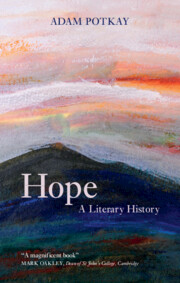Book contents
- Hope: A Literary History
- Hope
- Copyright page
- Contents
- Preface
- Introduction For and Against Hope
- 1 The Limits of Hope in the Ancient World
- 2 Eternal Hope: The Christian Vision
- 3 The Three Hopes of Humanism: Sacred, Profane, and Political
- 4 Something Evermore About to Be: Hope in the Romantic Era
- 5 Later Nineteenth-Century Responses to Romantic Hope
- 6 Modernism: Repetition, Epiphany, Waiting
- Notes
- Acknowledgments
- Index
6 - Modernism: Repetition, Epiphany, Waiting
Published online by Cambridge University Press: 27 January 2022
- Hope: A Literary History
- Hope
- Copyright page
- Contents
- Preface
- Introduction For and Against Hope
- 1 The Limits of Hope in the Ancient World
- 2 Eternal Hope: The Christian Vision
- 3 The Three Hopes of Humanism: Sacred, Profane, and Political
- 4 Something Evermore About to Be: Hope in the Romantic Era
- 5 Later Nineteenth-Century Responses to Romantic Hope
- 6 Modernism: Repetition, Epiphany, Waiting
- Notes
- Acknowledgments
- Index
Summary
Without a Messiah expected, and if one’s current pain or trial is meaningless, why not commit suicide? In the Modernist canon, suicide is typically putting an end to one’s misery because there’s no reason not to do so, or because one is in any event a machine caused to do so by necessary causes and effects. Albert Camus’ Myth of Sisyphus is an essay on how to live without hope or suicide; his novel The Plague starts with an averted suicide and ends with limited hope – or a hope for limits. Samuel Beckett’s Waiting for Godot begins and ends with the central duo’s wish, both times deferred, to hang themselves. Modernist responses to the question of meaning, and the attendant problem of suicide, include: persisting in hope or waiting despite the minimal probability of hope’s fulfillment (Franz Kafka, Richard Wright, Gwendolyn Brooks, Ralph Ellison, Beckett); the epiphanies of the everyday, getting what it seemed you hoped for even without exactly having hoped for it (Virginia Woolf); affirmation of the repetitions, recurrences, and accidents of natural and human life, overcoming their sameness through an act of will (Camus).
Keywords
- Type
- Chapter
- Information
- Hope: A Literary History , pp. 265 - 324Publisher: Cambridge University PressPrint publication year: 2022



